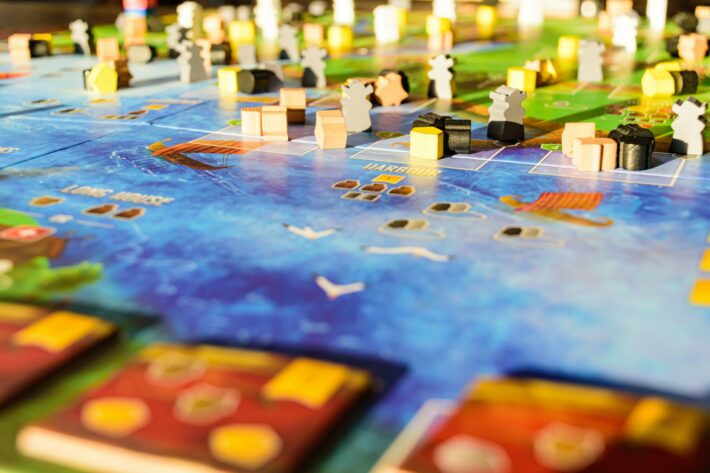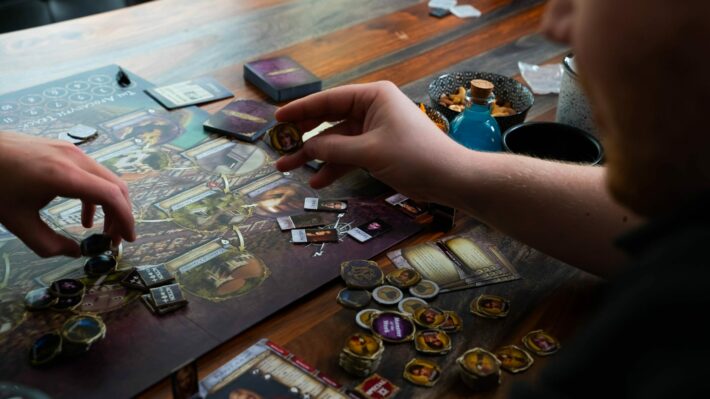Board games have been a source of entertainment for generations, bringing friends and families together for hours of fun. But have you ever wondered what it would be like to team up with your opponents instead of competing against them? That’s where cooperative board games come into play.
Our focus will be on the world of cooperative board games, their rising popularity, and how they promote teamwork, problem-solving, and social interactions. So grab your dice, gather your allies, and get ready to work together for victory!
What are cooperative board games?
Cooperative board games, as the name suggests, are games that encourage players to work together towards a common goal instead of competing against each other. In these games, players must collaborate, strategize, and pool their resources to overcome challenges and obstacles. From battling against a common enemy to solving mysteries as a team, cooperative board games provide a unique and thrilling gaming experience.
| Cooperative Board Game | Number of Players | Recommended Age |
|---|---|---|
| Pandemic | 2-4 | 8+ |
| Forbidden Island | 2-4 | 10+ |
| Ghost Stories | 1-4 | 12+ |
| Mysterium | 2-7 | 10+ |
| Gloomhaven | 1-4 | 14+ |
Why are cooperative board games popular?
Cooperative board games have gained immense popularity in recent years, and it’s not hard to see why. In a world that often glorifies competition, cooperative games offer a refreshing change of pace. They promote a sense of camaraderie, fostering a shared experience where players work towards a common objective. The cooperative nature of these games also eliminates the fear of someone being left behind or feeling excluded, making them accessible to players of all skill levels.
How do cooperative board games foster teamwork?

One of the key benefits of cooperative board games is their ability to foster teamwork. Players must communicate, strategize, and make decisions together to achieve victory. Whether it’s coordinating movements on a map or discussing the best course of action, cooperative games encourage collaboration and mutual support.
They teach players the importance of effective communication, active listening, and valuing the input of others. Through these games, individuals learn to work as a team and appreciate the strengths and abilities of their fellow players.
What are the benefits of playing cooperative board games?
Playing cooperative board games goes beyond mere entertainment. These games offer a range of benefits that can positively impact various aspects of life. They enhance problem-solving skills, as players must analyze challenges and come up with creative solutions collectively.
Cooperative games also improve critical thinking, strategic planning, and decision-making abilities. Additionally, they promote patience, empathy, and the ability to adapt to different situations. These valuable skills can be applied not only in gaming but also in real-life scenarios.
Can cooperative board games improve communication skills?
Communication is at the heart of cooperative board games. Players must effectively convey their thoughts, ideas, and strategies to the rest of the team. This enhances verbal and non-verbal communication skills, as individuals learn to express themselves clearly and understand the intentions of others.
Cooperative games also encourage active listening and the ability to provide constructive feedback. By playing these games, individuals can improve their communication skills, which can be beneficial in personal relationships, professional settings, and everyday interactions.
Which cooperative board games are best for families?
Cooperative board games are a fantastic way to bond with family members of all ages. They provide an opportunity for quality time, shared experiences, and laughter. Some popular cooperative games suitable for families include “Forbidden Island,” where players must work together to collect treasures before the island sinks, and “Pandemic,” where a team of specialists races against time to find a cure for deadly diseases. These games offer engaging gameplay and simple rules that make them enjoyable for both children and adults.
How do cooperative board games promote problem-solving?

Problem-solving is a fundamental skill, and cooperative board games are excellent tools for honing this ability. These games present players with various challenges and obstacles that require critical thinking and strategizing. By working together, players can analyze the situation, explore different options, and devise effective strategies to overcome hurdles.
Cooperative games encourage brainstorming, resource management, and out-of-the-box thinking. They teach players to approach problems collaboratively and consider multiple perspectives, enhancing their problem-solving skills in the process.
Are cooperative board games suitable for all ages?
Cooperative board games are incredibly versatile and cater to players of all ages. They offer different levels of complexity, ensuring that there is a suitable game for every age group. Some cooperative games are specifically designed for younger players, with simplified rules and engaging themes.
Meanwhile, there are more intricate and challenging cooperative games that appeal to older players and experienced gamers. The inclusivity of cooperative board games makes them a great choice for family gatherings, social events, and game nights with friends.
What are some examples of successful cooperative board games?
The world of cooperative board games is vast and ever-growing. Here are a few examples of successful cooperative games that have captivated players around the globe:
-
Pandemic: In this game, players work together as a team of specialists to prevent the outbreak of deadly diseases across the globe.
-
Forbidden Desert: Players collaborate to find and assemble an ancient flying machine to escape a desert before it engulfs them.
-
Mysterium: A cooperative mystery game where players work together to solve a murder by interpreting surreal visions provided by a ghost.
-
Spirit Island: Players take on the roles of powerful spirits defending an island against colonizers, using unique abilities to drive them away.
-
Ghost Stories: A game where players must cooperate to protect a village from waves of ghostly invaders using their unique Taoist powers.
How can cooperative board games enhance social interactions?
Cooperative board games provide an excellent platform for social interactions and bonding. Playing these games encourages conversations, teamwork, and shared experiences. They create a relaxed and enjoyable environment that facilitates meaningful connections between players.
Cooperative games also break down barriers and promote inclusivity, making everyone feel valued and involved. Whether playing with friends, family, or new acquaintances, cooperative board games strengthen relationships and foster a sense of community.
Are there competitive elements in cooperative board games?
While cooperative board games primarily focus on teamwork, some games incorporate competitive elements to add an extra layer of excitement. These elements can involve racing against a timer, comparing scores, or introducing hidden objectives.
The competitive aspects provide additional challenges and strategic considerations while still emphasizing the importance of cooperation. These games strike a delicate balance between cooperation and healthy competition, making them thrilling and engaging for players.
Can cooperative board games teach valuable life skills?
Cooperative board games offer more than just entertainment; they can impart valuable life skills. As players collaborate, communicate, and strategize, they develop skills such as teamwork, problem-solving, critical thinking, and adaptability.
These skills can be transferred to real-life situations, including school projects, work collaborations, and social interactions. Cooperative games also teach patience, empathy, and the ability to manage conflicts constructively. By engaging in these games, individuals can acquire essential life skills that will benefit them beyond the gaming table.
What strategies work best in cooperative board games?

Successful cooperative gameplay relies on effective strategies. Here are a few strategies that can help teams excel in cooperative board games:
-
Communication is key: Regular and clear communication is vital for sharing information, discussing strategies, and coordinating actions.
-
Plan: Anticipate future challenges, allocate resources wisely, and prioritize tasks to maximize efficiency.
-
Utilize each player’s strengths: Identify and leverage the unique abilities of each team member to optimize gameplay.
-
Adapt and be flexible: Be prepared to adjust strategies as the game progresses and new challenges emerge.
-
Embrace teamwork: Encourage collaboration, active participation, and the exchange of ideas to foster a cohesive team dynamic.
Are there cooperative board games based on popular franchises?
Yes, many cooperative board games draw inspiration from popular franchises, making them even more appealing to fans. Whether you’re a fan of fantasy, science fiction, or adventure, there are cooperative games that cater to various interests.
For example, “The Lord of the Rings: The Card Game” allows players to embark on epic quests in Middle-earth, while “Harry Potter: Hogwarts Battle” lets you join forces to defend the wizarding world against dark forces. These games combine beloved fictional universes with engaging cooperative gameplay, offering a thrilling and immersive experience.
How can cooperative board games strengthen relationships?
Cooperative board games provide an opportunity for shared experiences and quality time with loved ones, strengthening relationships in the process. By playing together, individuals build trust, foster teamwork, and deepen connections. Cooperative games create a positive and enjoyable atmosphere where laughter, friendly banter, and shared victories are celebrated.
They offer a break from everyday routines, allowing players to relax, engage, and create lasting memories. Whether with friends, family, or even new acquaintances, cooperative board games can bring people closer and create bonds that extend beyond the gaming table.
Final Takeaways: Working Together for Victory
Cooperative board games have revolutionized the way we play and interact. By shifting the focus from competition to collaboration, these games offer a unique and rewarding gaming experience. They promote teamwork, problem-solving, and communication skills, and foster social interactions.
From families looking for quality time to friends seeking new challenges, cooperative games have something to offer everyone. So gather your team, embrace the spirit of cooperation, and embark on thrilling adventures together. Remember, in cooperative board games, victory is not just an individual triumph but a collective achievement.